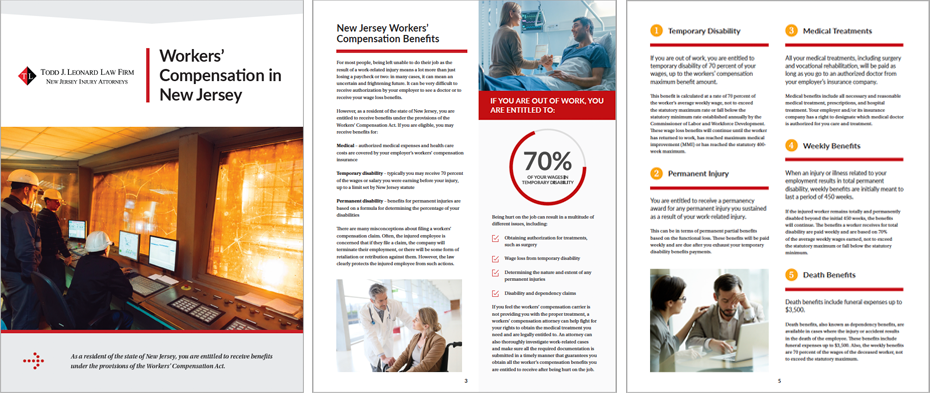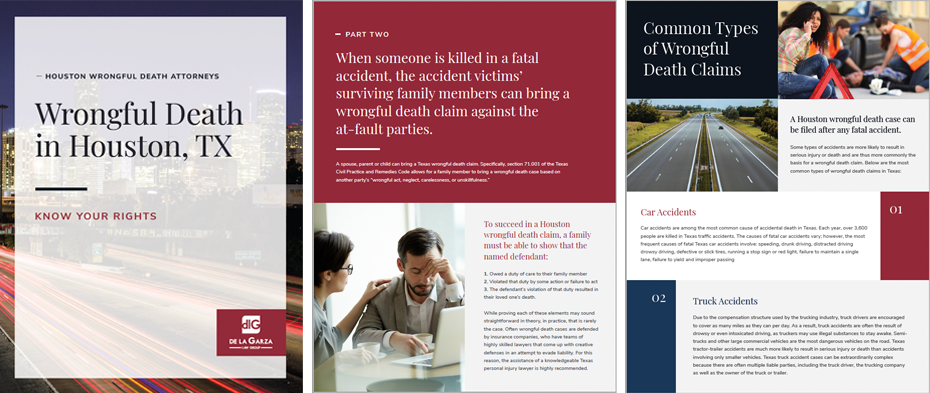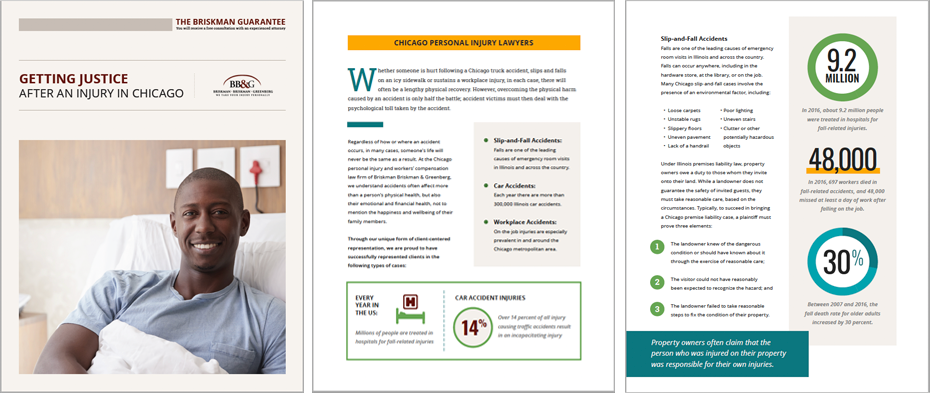Search engine optimization (SEO) gives law firms the highest quality clients at the lowest cost per lead of any other marketing channel. This should come as no surprise as the majority of legal consumers start their search for a lawyer online.
The market is there, it just has to find you. Lawyers like you are looking to SEO to build their firms because it works. But it takes more than keywords. You have to be found by legal consumers and then convert that traffic. Here is how we are making SEO work for law firms.
1. Your Law Firm's Website and SEO
Your website is serving two entities: search engines and people. Fortunately, Google is focused on serving the best results to their customers (searchers) which means what is good for humans is also good for search engines. Not every law firm SEO agency understands that.
Focus on Clients

Your website should speak directly to the needs and concerns of your clients. Whether your clients are corporate, getting a divorce, filing bankruptcy, suffering from a personal injury, seeking defense in a criminal case, wanting to secure their future of a loved one through special needs planning, your website should speak to their hopes, fears and expectations.
Custom Legal Marketing organizes focus groups for custom websites. We bring together people that have hired a lawyer in your practice area in your region and let them interact with your website's prototype. This gives us insight on how well your new site is speaking to the expectations of your target clientele. Here are some things we have learned from clients like yours.
Interactive Elements
Give your visitors something to do. Whether it is a slide show explaining the lawsuit process or other clickable elements, if you build it they will use it. We recommend interactive elements that explain a topic, calm a fear or give the visitor an idea of what to expect as they try to resolve their legal situation.
Above, example of the interactive elements explaining the personal injury lawsuit process.
Your Website's Code Matters
Your website's code needs to be clean, lightweight and fine-tuned for performance. It also needs to give Google the content it is looking for. Google looks for markups on your website to generate Featured Snippets.
What is a Google Featured Snippet?
Google Featured Snippets answer questions without sending people to your website. This may sound like it works against your interest but our studies have shown that websites that have a featured snippet see a 30 percent or higher click-through rate (or CTR) compared to their CTR when holding the same position without being featured.
Plus snippets like this example can be used to answer questions on Google Assistant devices like Google Home.
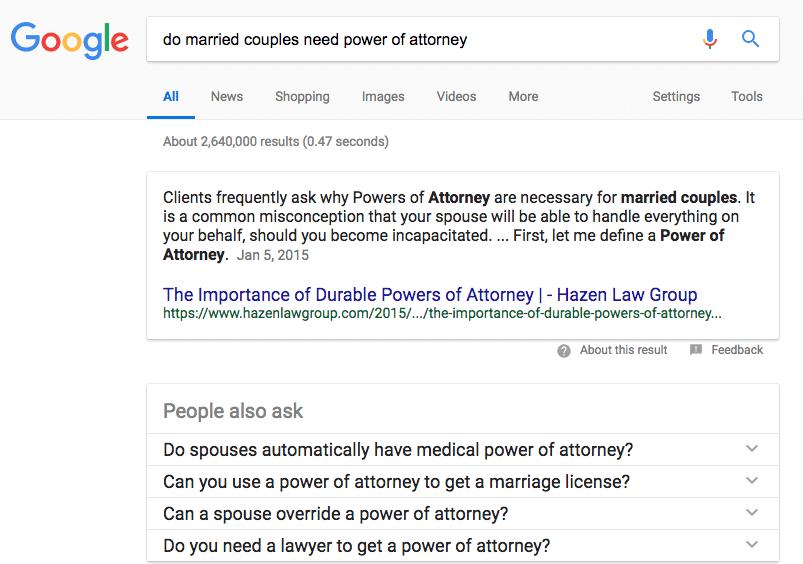
Above, example of a Featured Snippet targeting frequently asked questions regarding legal misconceptions for married couples.
What is a Schema Markup?
Rich Snippets or Schema Markups give Google information about your physical address, content and can help you improve your click-through rate by displaying client ratings in the search results.
By properly formatting your client testimonials, Google will have the data they need to display as star rating next to your search engine listing.

Above, example of a client review snippet for a Chicago personal injury law firm.
Mobile is Not Optional

Your website must be responsive and provide an optimal experience at any size. With Custom Legal Marketing's custom websites, our team considers the various user behaviors of phone, tablet and desktop visitors and then makes sure your website delivers the best experience.
Last year, we published a report on Forbes about mobile traffic on law firm's websites, titled "Does Mobile Dominate Law Firms' Web Traffic". While mobile activity varies between practice areas, all areas of law are seeing big increases in small screen traffic. Mobile is not optional, it is as important if not more important than your desktop experience.
The site is great, but your continued ability to take care of us is what made a real difference. Great job to the entire team!
- Jim Fausone (Legal Help for Veterans)
Get an Award Winning Team

Call 1.800.789.6451
The Right Keywords
Our SEO strategy consists of focusing on highly competitive keywords while simultaneously casting a wide net of secondary long term key phrases. People are not only using general keywords but they are asking detailed questions, they are looking for specific answers. Meet their demands and you will get leads.
Here are the types of keywords we target through our SEO plans:
GENERAL KEYWORDS (HIGH COMPETITION):
A general keyword is a common word used to identify your practice area. Here are some examples of general keyword:
CONVERSATIONAL KEYWORDS (MODERATE COMPETITION):
A conversational keyword is a statement or question presented by the searcher. Conversational keywords are as follows:
These keywords present a unique opportunity to becoming a trusted source of information for your potential clients. You should provide answers that are in depth, easy to understand and on topic.
STRATEGIC KEYWORDS (LOW COMPETITION):
Strategic terms are a great way to rank well in search results for many low volume keywords, a beneficial strategy for getting unique cases. Your strategy should never exclusively target low competition keywords; this should only be one part of your total keyword strategy. Examples of strategic keywords include:
Together, this strategy helps your firm get ranked quickly for strategic and long tail keywords while we pave the way for high positions on competitive general keywords. But we don't stop there. As your law firm's SEO agency, Custom Legal Marketing also looks for new keyword opportunities to take advantage of so that your search campaign is always evolving.
SEO Elements
Meta tags may not be as critical as they used to be. But properly formatted Headers and Alt tags are important SEO elements that your agency should properly setup on every page of your law firm's website. Here is a description of what each of these elements does and how to properly use them.
Meta tags are located in your source code towards the top of the page. Only the Title field is visible to visitors while search engine bots read the other information.
Below is an example using our homepage meta tags:
<title>No Competition™ - Exclusive Law Firm Marketing & SEO Company.</title> <meta name="description" content="Get an exclusive law firm marketing partner and award winning web design team. If your SEO company is working for your competitors, you need our No Competition™ Guarantee."/> <meta name="keywords" content="law firm marketing, legal marketing, lawyer SEO, law firm SEO"/>
Meta Tags Explained
Title Tag
The title tag is generally what will appear in Google as the title of your search engine listing. You should include your primary key phrases in the title but also give visitors a reason to click on your site. You may be tempted to have a title like "Phoenix Personal Injury Lawyer, Car Accident Attorney, Slip and Fall Law Firm" but your click-through-rate will be substantially higher if you go with something more concise like "Phoenix Personal Injury Lawyer: Start Your Free Consultation Now."


Description Tag
This is another opportunity to convince visitors to click on your site. You have approximately 30 words to convince a searcher that you have the answers they are looking for. A description should include your targeted keywords but like your title, it needs to give people a reason to visit your site. Think about ways to use your keyword in a compelling call to action. Also keep in mind, Google may not always show your description. Sometimes they will pull content from the page and use an excerpt in place of the description you are giving them.
Keywords
The keyword tag is where you tell search engines which key phrases you want to rank for. If you were building your website 15 years ago, your keyword tag would be a strong part of your onsite SEO. But this is 2019 we're talking about and search engines are a lot smarter. Keyword tags have been mostly ignored by Google and other search engines and it is Custom Legal Marketing's policy to simply omit this meta tag from our websites. In fact, the keyword tag above was created as an example as our homepage does not actually have a keyword meta tag.

Alt Tags
Alt tags are incredibly important but often overlooked. While image recognition technology has come a long way, search engines still rely on text to determine what content is on a page. If you have images on a page and have not assigned an alt tag, you are missing out on an opportunity to reinforce your keywords.
For example, let's say we have a graphic of an award that we have won for a law firm's website. The alt tag might look something like this:
<img src="new-award.png" alt="2019 Best Award for Smith & Smith LLP's Website">
Without the alt tag, Google would just see the "new-award.png", the image filename. But with the alt tag, we can reinforce one of our targeted keywords, "Law Firm Website."
Here are a couple of things to keep in mind when using alt tags:
No spam: You want to accurately describe the object(s) in the image. However, do not just list keywords, you have to include your keywords in an accurate description of the picture.
Keywords are not always appropriate: All graphics and images should have an alt tag even though many will not require a keyword. An example of that would be your social icons. You may have an icon on the bottom of your page for Facebook, Twitter, and LinkedIn. The alt tag for those graphics should just be "Facebook", "Twitter", and "LinkedIn". Going overboard and putting in unnecessary keywords may result in Google determining that your website is spammy thus working against your law firm's SEO goals.
Content Marketing

If you want to get ranked for a keyword, you have to have content that speaks to the search. That does not mean doorway pages and low quality content that exists just for the sake of having a lot of pages, you need to have high quality content.
Of course, you have heard of that before but what does that mean?
Blogs: Your law firm's SEO agency should still post blogs to your website. This is helpful for reporting on local events, legislative changes and other timely topics. Do not flood your blog with a lot of content, blog about things that are topical, timely and provide value to your visitors.
Questions and Answers: Building on the keyword strategy above, you should publish answers to frequently asked questions on a regular basis. This content is helpful for existing website visitors and people finding your firm through search results.
Long Form Content: When you need to cover a lot of information and want to dominate the search engine results, long form pages deliver.
A long form page is a multimedia page that generally has more than 1,500 words and may include graphics, charts, video and audio content. the massive amount of content is broken up into horizontal sections that are easy for the visitor to read. They pack a powerful punch in the search results.
Sometimes, a long form format is used for standard practice area pages like this:
Briskman Briskman & Greenberg - Chicago Car Accident Lawyer
Littman Krooks LLP - Elder Law Attorneys
Brill Legal Group - Field Sobriety Test
Erlich Law Firm - Sexual Harassment Lawyers
Sommers Schwartz - Michigan Medical Malpractice
Todd J. Leonard Law Firm - Truck Accident Lawyers
Hazen Law Group - ABLE Accounts in Pennsylvania
Steinberg Law Firm - South Carolina Truck Accident Lawyer
The writing and content team at Custom Legal Marketing consists of journalists, lawyers and marketing professionals that know how to dig deep into topics and present information in a way that connects with your audience.
CLM is the real deal when it comes to SEO. I don't think that you could make a better choice.
- Paul Greenberg (Briskman Briskman & Greenberg)
Press Outreach: A great way to build awareness and help your search engine performance is through press outreach. Anytime you add a new lawyer, win a big case, or take on a case that has local or national appeal, the team at Custom Legal Marketing can distribute your news to readers as well as editors and journalists in mainstream media.
While online press releases are not an effective link building strategy, they do help your firm build credibility and get referenced in an authoritative media outlet, which can improve of your website. Sounds farfetched? Talk to Custom Legal Marketing about other secrets law firm SEO agencies are afraid to publish

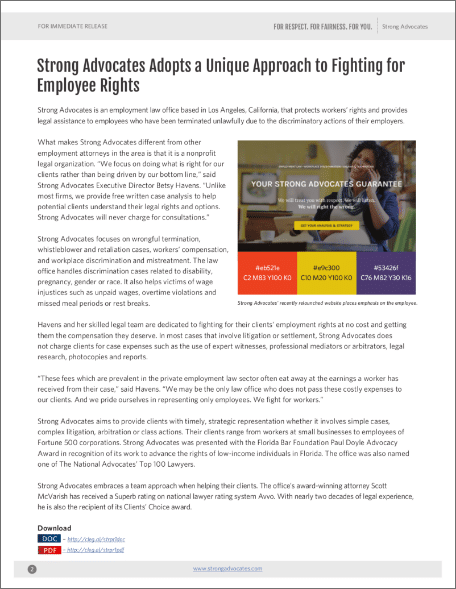
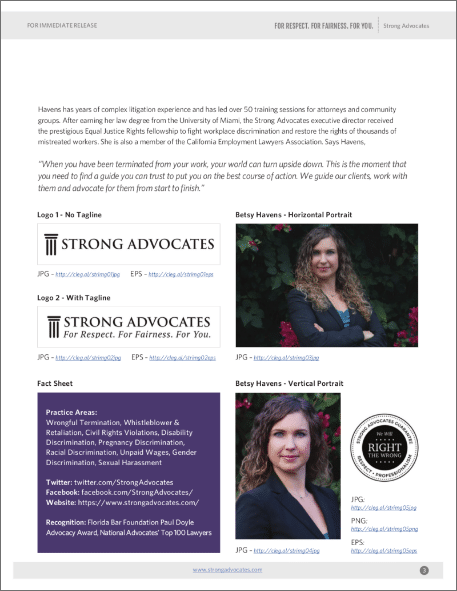
Above, example of a Press Kit for Strong Advocates.
What Are Local Citations?
A local citation is simply the mentioning of your law firm's name, address and phone number on other sites. A citation may also include other information like your website address. The reason citations are important is because they give Google third party verifications of the information you have provided on Google My Business. If you are telling the same thing to 100 other directories and business networks, the information is likely accurate.
Custom Legal Marketing has developed a process of getting quality citations that includes:
Where to Get a Local Citation?
If you are looking for a way to establish a solid foundation for your law firm's website and do some DIY citation building, here are some places to get started:
Business Directories: Directories like Yelp, Mapquest, Yellow Pages and others are great places to start your local citation building. Since most of your competitors will have listings on these websites, this is where you need to begin just to get in the game.
Legal Directories: While business and local directories are available to all industries, legal directories are great places to get relevant local citations. Free legal directories for attorneys are less common than general local directories so you should plan on paying for a handful of legal directory listings as part of your online marketing budget.
Here are some great legal directories to get you started:
Paid
Free
Once you have a strong foundation using local listings and legal directories, you can then move on to other types of citations using videos, ebooks, podcasts and other forms of media. We will discuss this strategy in our link building section.
What is RankBrain?

RankBrain is a machine-learning system used by Google to presume what is the best result a person may be looking for. This is generally used for new search queries Google is not familiar with.
Links are one of the most important factors for ranking well in Google's search engine. Google places a great deal of weight to links, because they can show a website has merit and trustworthiness through the democracy of inbound links.
Take The New York Times, they are leaders in their industry and most people consider them the apex news publication. If The Times links to a site in one of their articles, this shows Google and users alike that particular site must be legitimate and useful. This action in the digital marketing world is known as passing on "link juice". This is the basis for why links are so important for the success of your website. It is almost like the website is being peer-reviewed, and acquiring a link shows that it has passed the requirement of being useful to viewers.
Google will generally reward any links that are acquired organically, or on their own. Some domains may hold more weight than others, due to their exclusivity and trustworthiness. Domains like .edu and .gov are examples that may hold more value than the typical .com or .net. However, a website with an .edu does not necessarily carry more weight, .edu websites of universities and colleges just typically have a lot of authority.
Google will frown upon certain practices to acquire links and may subsequently cause penalties and drop in rankings. These practices are known as "black hat" and include:
Paid links are acquired by opening your wallet. You did not deserve or earn this link for your merits, rather you spent money to have it artificially placed for you.
Some websites, after their article, will open up the comment sections for readers to remark on the topic. Instead of writing a comment, however, people would instead input their website URL a comment, thus gaining the link juice from that page. Google has since remedied this situation by implementing the "no-follow" tag, which will tell the search engine to disregard this link, and no link juice will be acquired. You will still get the visibility, but the link itself will hold no weight in determining ranking.

Private blog networks (PBN) are probably the most sinister of the black-hat link strategy. Black-hat marketers will create a host of blog websites with the sole intention of hyperlinking their websites with their desired keywords. Often the content on these blogs is incoherent, and obviously not written for human consumption. Black-hat marketers will sprinkle keywords they want to see rank well sporadically throughout the post. Google dislikes this strategy and if caught, will give you a manual action penalty. Often it is hard to come back from a PBN penalty.
Guest blogging used to be okay, but has been deemed spam by Google. You pay an authoritative website to post your blog content on their website, including a hyperlink to your respective website.
Low-Hanging Fruit

The "low-hanging fruit" strategy is something every law firm SEO agency can, and should do. It entails finding easy opportunities to acquire links and increase visibility for your website. But it should be a starting point, not the entire strategy.
Two low-hanging fruit link opportunities you should take advantage of are directories and social media.
There are many different types of directories on the internet. General or industry-specific like legal, regional and local directories are the sort you should include when link-building. If your law firm only operates within a certain state or county, try finding directories that help people find businesses for that particular place. State and local associations often have directories you can be a part of, assuming you reside or operate within area.
Having a social media presence is really important in the success of your law firm. Word-of-mouth and reviews can flow through your channels, giving you publicity. As a law firm, there are four social media companies that you should be using: Facebook, Twitter, and LinkedIn. The great thing about social media is that in your profile you can include a link of your website. Most social media companies have a no-follow tag from links, but you can still get visibility that will benefit the overall health of your firm.
Links Worth Earning

As mentioned earlier about low-hanging fruit link opportunities, there are other ways of acquiring links that require an experienced law firm SEO team.
Unsolicited links are acquired purely on the value of your content. For example, you have a topic where you undoubtedly have the best material, and because of that, other sites link to your content for reference or extra information. Authoritative sites will often accrue unsolicited links. To get these links, you must put in the effort to publish the best possible content.
Quoted links are when a news publication asks you for your opinion regarding the topic at hand. While your firm may not always be hyperlinked, link-less mentions can also play a role in giving your firm a ranking boost. In order to be quoted often, you must show that you are an expert and have a law firm marketing company is constantly in touch with the press to learn about opportunities.
Editorial links where you provide content for a writer's point can be mutually beneficial. Also, they can pave the way for future collaboration. Journalists often need experts to talk to when digging into legal matters or reporting on high profile cases. Maintaining a positive dialog with the press is mutually beneficial.
Links from award websites can also be helpful. These awards can yield links from websites like Super Lawyers, US News, and Million Dollar Advocates.
Onsite Links
Most of the links mentioned in the previous section have been related to getting others to link your content or linking through other sites. Onsite linking is also important for establishing credibility. Its also very helpful to your visitors.

There are two kinds of links you can implement on your website:
Internal linking is when you link your own content to another part of your website. You must be aware to not over-link; internal linking can make that respective page look like spam. However, you should look for opportunities to link to blog posts, articles, or other practice area pages that may be of interest to a person on any given page.
External linking is where you link your content to someone else's page. You would do this when you need to help your reader expand on the idea you have or show that your content is well researched.
Google Reviews
It is critical that you maintain a steady stream of new client reviews on your Google Business profile. Not only is it important as a ranking factor, having a 5 star rating makes it more likely that searchers will click on your listing when your law firm appears high in the map. Your law firm's SEO agency should provide your attorneys with a tool to help build a robust profile of reviews.
How to get Google Reviews:
Our review generation system makes it easy for your firm to collect client reviews and keep your review count growing.
You simply input your clients' information and then our system sends a review request via email or text.
Reminders are sent out over time and they stop automatically when a user reviews your firm.
Yelp Reviews

While not a direct ranking factor, reviews on Yelp are important as the website has high consumer trust. However, there are some common challenges when getting Yelp reviews.
Yelp's filtering system often filters reviews of new Yelp users. To ensure the best results, you should ask for Yelp reviews in your law firm's office.
Request a Yelp sticker to display in your office.
Encourage clients to review your firm on the Yelp app while standing in your office. This helps Yelp verify the reviewer is an actual client.
We encourage our law firm SEO clients to also prioritize getting Yelp reviews only after there is a significant number of Google reviews. For people that are referred to your law firm and search for you by name, they will often be presented with search results including your Yelp profile, Facebook profile and other directories along with your law firm's website.
Every website that lists your firm often lists a rating which is why it is important to generate reviews on multiple websites.
Facebook Ratings
It is likely that a prospective client that has been referred to you will land on your Facebook page. To reinforce your good reputation, you should have a healthy number of five star ratings on you law firm's Facebook page.
To get clients to give a positive ratings on your Facebook page, Custom Legal Marketing can connect the same system used to get Google Reviews to Facebook.
How to get Facebook Ratings:
Plug your client's information into the Custom Legal Marketing review generation system.
Clients will see Facebook as an option along with Google and legal directories, to encourage them to publicly review your firm.
Our system sends review reminders via email and text messages.
Better Business Bureau
If you think the Better Business Bureau (BBB) has lost ground to social media, you are in for a surprise. According to our focus groups for projects in every area of practice, the BBB is one of the most highly trusted consumer ratings platform. When asked to weigh the importance of the BBB rating, many in our focus group give it a 5 out of 5.

Why is the BBB so highly trusted?
The Better Business Bureau has been around for over 100 years. With over a century of name recognition, they have built their reputation on delivering unbiased reviews and mediating conflicts between consumers and businesses. Because of their high standards, reviews on BBB profiles cannot be easily manipulated or forged. If a business has an A+ rating, they probably earned it.
In most areas of law, you can expect to pay a membership fee of $250-$500 per year. Since consumers want to see the A+ rating when deciding whether or not trust your firm, it is well worth the investment to get the BBB A+ badge to display on your site.
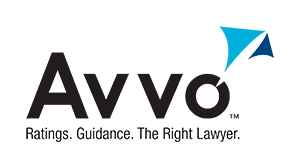
Avvo Ratings
Websites like Avvo also carry a lot of authority with people searching for a lawyer. Unlike Google, Yelp and Facebook, Avvo also displays ratings from your peers and has an algorithm that automatically assess a score if you do not have a rating. This score can relate to records with your state's Bar Association and other factors.
Because of the high value of client reviews on other websites like Google, Yelp and Facebook, you should encourage your colleagues and associates to review you on Avvo while directing your clients to other sources. Unlike other websites listed above, Avvo rates individual lawyers and not entire law firms. This means that every attorney in your firm should pay close attention to their individual rating.
Reviews on Your Websites
Posting reviews directly on your website could lead to higher click-through rates from your organic search listing. If your reviews are properly formatted with Schema markups, the ratings given by your clients can also be displayed in Google.

Above, example of a client testimonial slider as seen on Todd J. Leonard Law Firm's website.
Here are the best video styles for law firms:
Explainer Videos
A brief explainer video depicting on of your attorneys talking about one of your practice areas can help visitors get to know your firm. These videos should be brief (under 2 minutes) and get straight to the point.
Above, a personal injury attorney with Steinberg Law Firm answers the question "Can I Be Compensated for Pain and Suffering?".
How to use explainer videos:
Client Testimonials
Getting clients to site in front of a camera can be challenging but once you have a willing candidate, you should definitely create a testimonial video.
Above, video of a client testimonial for the Philadelphia personal injury attorneys at MyPhillyLawyer. Video Production by Ivy Creative.
How to use testimonial videos for law firm SEO:
Firm Story Videos
A story video is a promotional film that gives your firm meaning. Why are you helping your clients? Why did you choose this area of law over something else? What gets you in the office each day ready to fight for your clients? A firm story video can share your passion with your visitors and turn them into clients.
Above, video from the Sommers Schwartz, a personal injury law firm in Detroit Michigan.
How to use a law firm story video:
Text Only Videos
Over 85 percent of Facebook videos are played with the sound off. That means, Facebook users are watching but not listening. To get the most out of your Facebook video campaign, create a text only video.
Above, video about Chicago's dog bite problem.
How to use a text only video for your law firm's SEO efforts:
Types of Podcasts
There are several ways to structure your podcast episodes.
Blog Based Podcasts
Above, example of a blog based podcast discussing a death caused by a car accident.
With this format, a voice talent reads one of your blogs, articles or news releases to create a 2 to 5 minute episode. Some changes are made to the original content to make it sound more conversational and appropriate for voice. Blog based episodes are easiest for most firms because Custom Legal Marketing can handle the entire production without participation from your firm.
Conversational Episodes
Above, example of a conversational podcast discussing "Trumps Travel Ban and the Courts" from New York criminal defense lawyers at Brill Legal Group.
With a conversational episode, a lawyer from your firm engages in a dialog with a host. This can be based on a pre-recorded segment or we can create an episode based on a pre-determined list of questions. These episodes are typically longer (10-15 minutes) and will require a time commitment from an attorney or representative with your firm.
Radio Show Episodes
Above, example of a radio show episode podcast with a local Councilman.
Some lawyers are already participating in spots in local media. In this case, we can take the episode, develop a podcast feed and use these episodes for the firm's podcast.
Creating a Podcast
If you are developing your podcast in-house, you will need the following equipment:
Professional microphone.
Podcasting software such as Garage Band or Audacity.
A podcast feed setup on your website.
To get approved in the most podcasting networks, you should invest in a professional introduction.
Above, example of a podcast intro for Strong Advocates law firm.
You should also have a professionally designed cover which will be used as the cover art displayed on podcast listings and devices while your podcast is being played.
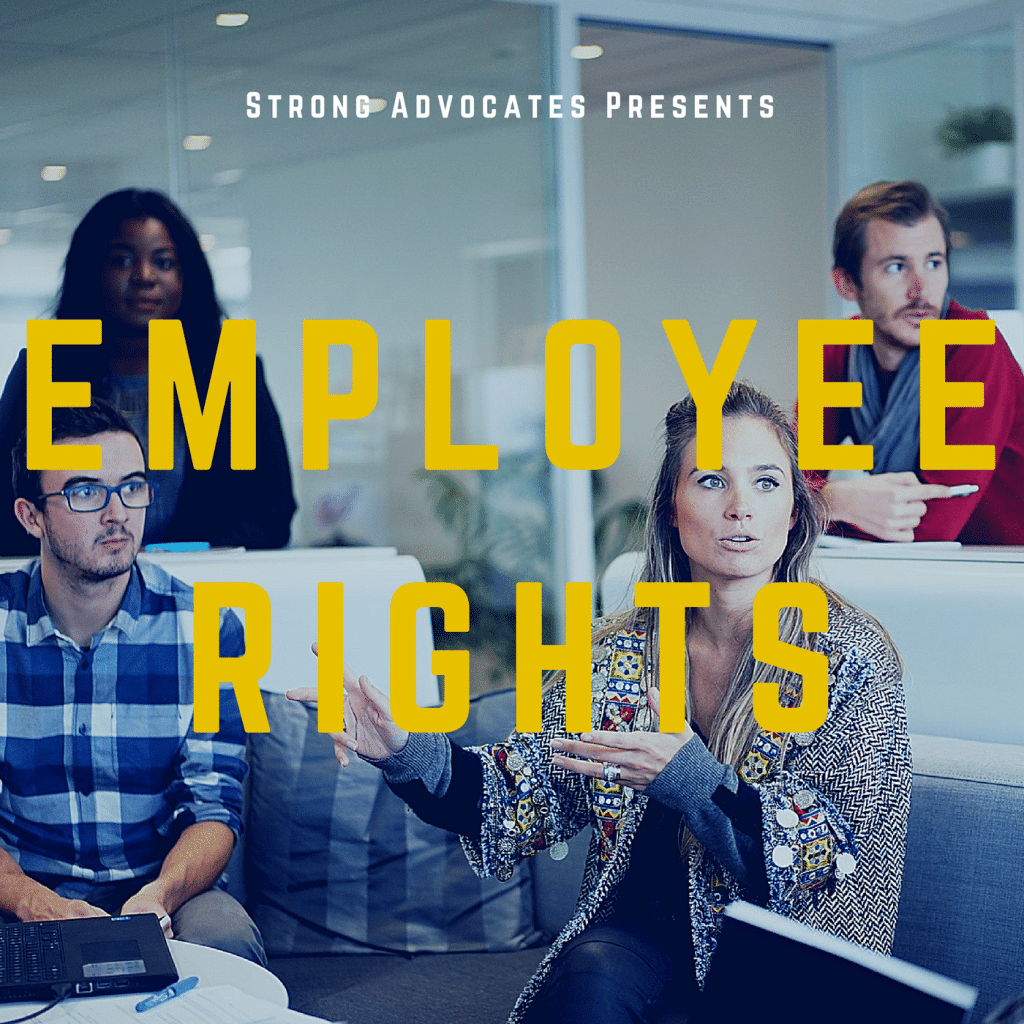
Above, example of a cover art for Employee Rights, a podcast series by Strong Advocates; an employment law firm in Los Angeles.
The recording of a podcast can take between 1 and 3 hours depending on the length and number of takes required to get it perfect. Editing of the podcast can take another 1-5 hours. Conversational podcasts typically take longer especially when the interviewer and representative form your firm are in different locations.
Once the podcast episode is complete, it gets posted to your website in your podcast feed.
Where Do Podcasts Go?
Once the feed is established and you have podcast episodes, Custom Legal Marketing can get your feed listed in iTunes, Google Play and other podcasting networks. As each episode is shared and promoted, we are able to build more links and citations back to your website.
Podcasting is both a promotional tool and link building tool that is part of your law firm SEO plan that works.
Promote it on Your Website
When visitors read your blog or articles, your can prompt them to download your ebook by collecting their name and email. By using a non-intrusive slide, you can grab their attention but not disrupt their browsing experience. We typically see higher bounce rates and exit rates when websites stop the user's ability to read and place a large pop-up in the middle of the screen. Custom Legal Marketing can help you choose the best placement for your ebook/newsletter prompt.

Above, example of a pop-up promotion for an eBook.
Social Campaign
By using in-ad subscriptions, you can promote your ebook on Facebook and allow users to subscribe to your email list and download your ebook without ever leaving Facebook. This typically yields higher conversion rates than forcing users to go and the ad to your website to subscribe.
Distributing Ebooks
Aside from using your ebooks as a list building tool, you can also use them as a link building tool. By distributing ebooks to websites like Issuu, Slideshare and other networks, you can link back to your website and include your local citation in the description of the document.
9. Social Marketing for Law Firms

Where to Post?
Your social activity is more about brand building and name recognition than law firm SEO. Thus far, we have found not correlation between social activity and search engine rankings.
But that does not mean that social media cannot play a powerful role in your SEO and online marketing strategy. In fact, Facebook and other outlets can generate traffic and soft conversations through email signups, seminar announcements, ebooks and more.
Depending on your practice area, you will get different responses from the different social channels. Often, the best responses will come from Facebook. However, business oriented law firms like intellectual property, employer rights, contract law and real estate law firms should put a strong emphasis on LinkedIn. Twitter activity and Google My Business Posts can be automated with your website content but we do not typically recommend investing a lot of resources to build your presence in those communities. YouTube is definitely a valuable network as we discussed in the prior video and media section.
Thus far our tests with Instagram and Pinterest have yielded little results for law firms but we predict that Instagram will become a valuable network in the future.

What to Post?
The types of content you post on social media depends on the network. Some networks are better for certain types of content that other networks. Here are our recommendations based on each network.
Post for Free
Share content from your law firm's blog.
Share press releases about your firm.
Share information on local events that you are sponsoring or that are related to your area(s) of practice.
Share announcements about awards and accolades.
Share news articles that are citing your attorneys and referencing your firm.
Reviews
Encourage happy clients to give you a review on your Facebook page.
Paid Promotions
Promote videos about your firm to your target audience. Remember, your videos should have large text and not rely on sound. Over 75 percent of Facebook videos are viewed without audio.
Use in-ad sign-ups to build your email list by promoting your ebook.
Spend $10 to $20 to "boost" posts that cover relevant topics or put your firm in a positive light (e.g., your law firm donates money or goods to an organization).
Remarketing - show your ad on Facebook to users that have visited your website.
Promote your page to gain more followers.
Post for Free
Share content from your law firm's blog.
Share press releases about your firm.
Share information on local events that you are sponsoring or that are related to your area(s) of practice.
Share announcements about awards and accolades.
Share news articles that are citing your attorney and referencing your firm.
Paid Promotions
Promote your Profile to gain more followers.
Google Business Posts
Post for Free
Share content from your law firm's blog.
Share press releases about your firm.
Share information on local events that you are sponsoring or that are related to your area(s) of practice.
Share announcements about awards and accolades.
Share news articles that are citing your attorney and referencing your firm.
Post for Free
Share content from your law firm's blog.
Share press releases about your firm.
Share information on local events that you are sponsoring or that are related to your area(s) of practice.
Share announcements about awards and accolades.
Share news articles that are citing your attorney and referencing your firm.
Encourage each attorney to share their own success stories (accolades, case results, etc.) on their profiles and make sure they link to your LinkedIn Company Page.
Long Form Post
Publish long detailed articles on LinkedIn. This especially valuable to attorneys. Whereas most social media is focused on brevity, LinkedIn allows full length articles to be posted and shared.
Paid Promotions
Promote your LinkedIn articles to the audience most likely to become clients.
Run ads that target your clientele. LinkedIn ads should not be used for consumer based law firms such as personal bankruptcy, family law, personal injury and criminal defense but can be effective for intellectual property, business law and real estate law.
YouTube
Post for Free
Video content developed by your firm.
Informational videos, client testimonials and firm story videos.
Paid Promotions
Promote your commercials to users with targeted interests in your region.
Use YouTube pre-roll videos as part of your re-marketing efforts to show your firm's commercial to past website visitors.
Medium
Post for Free
Write detailed articles on Medium and then share these articles on your other social profiles.
Social activity is valuable for brand awareness and spreading positive news about your firm. You can successfully use it to generate soft conversions like email signups and promote your events.

Once your campaign is created the real challenge is getting it to perform and generate leads. With a well-refined campaign resulting in a high Quality Score, your ads can achieve better position on the SERP while also paying less per click. This is why having a certified Google Partner overseeing your campaigns is fundamental to the cost-saving and success of Google Ads.
The three main responsibilities of the Google Partner Certified PPC team at Custom Legal Marketing is to curtail the bidding strategy to best fit your goals, campaign management and conversion optimization.
Bidding Strategies
There are three main bidding strategies you can adopt depending on your objective. If your goal is to drive traffic to your website, then optimizing for clicks is the approach you should take. If brand awareness is what you are looking for, then focussing on impressions will give you the results you want. If you want the user to perform an action on your site, such as contacting your law firm, then conversions is what your Google Partner should be striving for. For law firms, conversions are what you want. You want your prospective client to either call your firm directly or from the ad, use your contact form or start a live chat.
The first four positions on the Search Engine Results Page (SERP) are objectively the most optimal positions to have when using Google Ads. Almost no one goes past the first page, and having your ad on one of the bottom three positions does not bode well for you, because the searcher will have had already seen other ads or organic listings from your competitors long before they reach your ad.
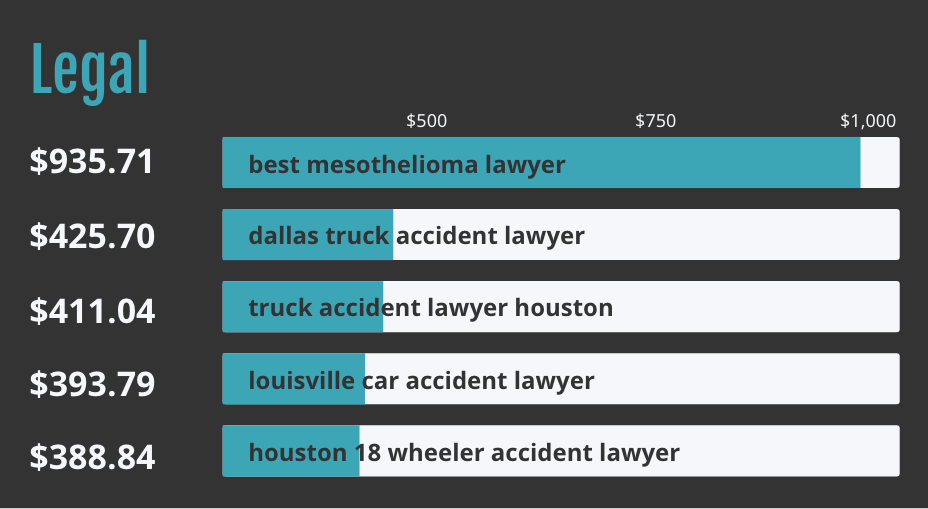
Above, infographic of the top five most expensive "legal terms" for Google Ads (formerly Adwords) in the U.S. (Source: Search Engine Watch)
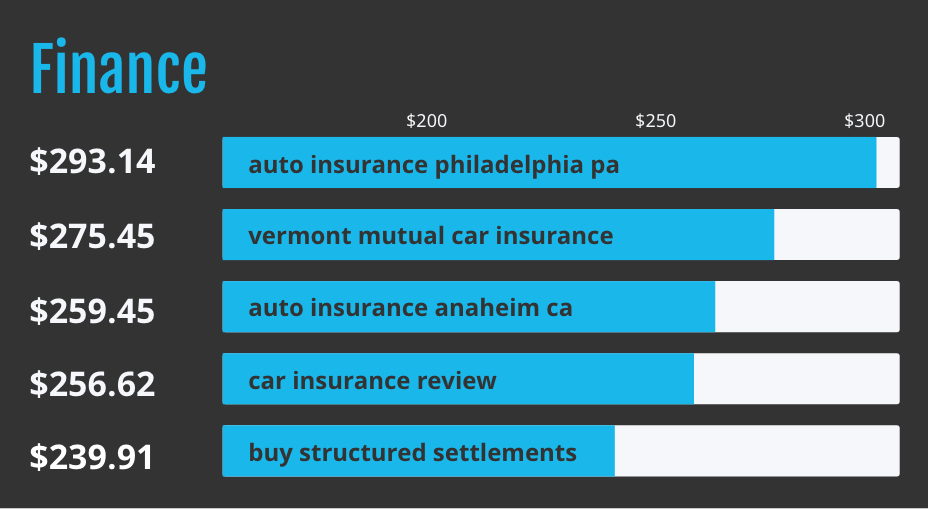
Above, infographic of the top five most expensive "finance terms" for Google Ads in the U.S. (Source: Search Engine Watch)
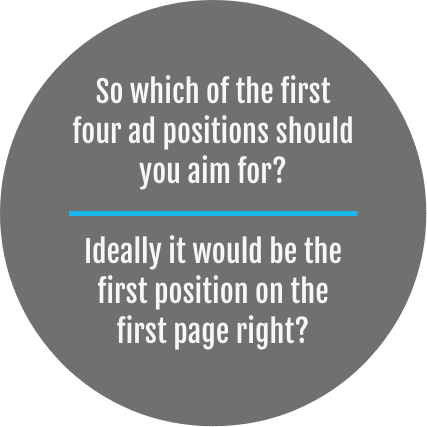
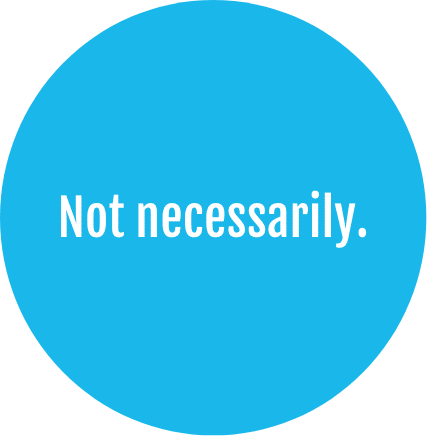
Having the first position means your ad is the first thing people see when they search, superseding all organic and paid listings. However, having the first ad position may not always be the best strategy.
It is an instinctive mentality to be first, to be the best. This attitude means almost everybody will be bidding for the first page, first position listing. Google Ads uses an auction-type system in determining who gets what position for their respective ads, coupled with your ad Quality Score. As you can surmise, this means the first position can be extremely expensive, especially for highly searched keywords such as "personal injury attorney" or "car accident lawyer".
Based on Google Ads' own statistics, the suggested bid for "personal injury attorney" across all locations is $126.79 for a single click. If you have a daily budget of $200, and two people click on your ad at that price, your ads will stop running because you have exceeded your daily budget. Now compound that with the legitimate chance those two people do not covert on your ads; ultimately, you lose an entire day of potential clients seeing your ads because you went for the highly priced, top ad position.
Also, the first website often gets a lot of traffic but people generally feel the need to "shop around". Which means even if the most paid-clicks go to your firm, you are probably not going to be the last stop on their search for a lawyer. In some markets, being No.2 is the best way to get high conversion rates with low conversion costs.
Campaign Management
Google Ads (formerly Adwords) is constantly evolving. It is not a service where you can create a campaign and check in every month or even every week. You need proactive management almost daily.
Your PPC management teams need to periodically adjust your bids to check if the estimated first-page bid has increased. But that is just the beginning.
After a campaign runs for a while, you should have enough historical data to determine which keywords have been performing well for you and which keywords are just costing money. For example, if you see a keyword that garners a lot of clicks but does not convert enough or at all to justify it being active, our team would disable that keyword. This gives your other, well-performing keywords more opportunities to flourish.
Using Negative Keywords Has Positive Results
Another important proactive management task you should perform often is an audit of your campaign's search terms.
Search terms often show the actual search query people performing when they see or click your ad. With this, you can filter out the terms you do not want your ads to be eligible to appear on. If you see a search query that does not apply to you law firm, such as "pro bono lawyer" or "estate planning without a lawyer" you can take a phrase like "pro bono" or "without a lawyer" and input it into the "Negative keywords" tab. This will prohibit anyone searching for those particular queries to see your ad, thus reducing your spending and only showing ads to relevant, potential clients.
Conversion Optimization
Campaign optimization is about getting clicks. Conversion optimization is about getting leads.
At Custom Legal Marketing, we are always running tests to improve conversions. Even when a campaign is enjoying between 40 and 50 percent conversion rates, we still look for opportunities to improve.
With Custom Legal Marketing's A/B testing program, we can brainstorm on what we may think can increase conversions, input those changes on the landing page and test the results with real people searching. The two different landing pages will be shown equally, thus accumulating real-time data on what works. After a few weeks of testing, we analyze and conclude whether that experiment actually yielded better results and if so, implement it across all campaigns.
We use dynamic conversion optimization software to allow us to quickly deploy and measure tests.
Always Be Testing
![]() Ad language
Ad language
![]() Keywords
Keywords
![]() Keyword placement
Keyword placement
![]() Landing pages
Landing pages
![]() Calls to actions
Calls to actions
![]() Placement of conversion rich elements like testimonials, third party ratings and case results
Placement of conversion rich elements like testimonials, third party ratings and case results
What You Should Track
![]() Phone calls
Phone calls
![]() Contact forms
Contact forms
![]() Live chat
Live chat
Tracking Your Law Firm's Search Engine Rankings
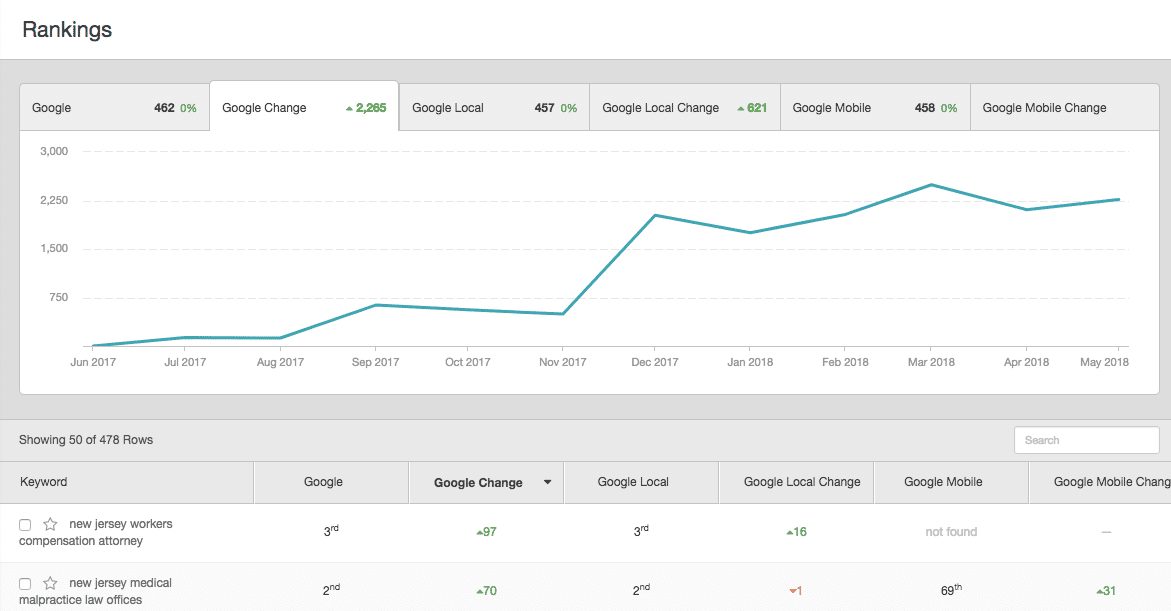
Above, example of a line graph for a firm's search engine ranking.
With the CLM Lounge, you are able to see which keywords are up, which keywords are done and how your overall growth is trending. Your SEO reports include:
Daily ranking changes
Google Rankings (standard)
Google Local Rankings
Google Mobile Rankings
Since organic results on desktop sometimes vary from mobile, we track these results individually. Remember, Google's Mobile First Indexing started in 2018 so in 2019, you need to be ready.
Tracking Your Backlinks
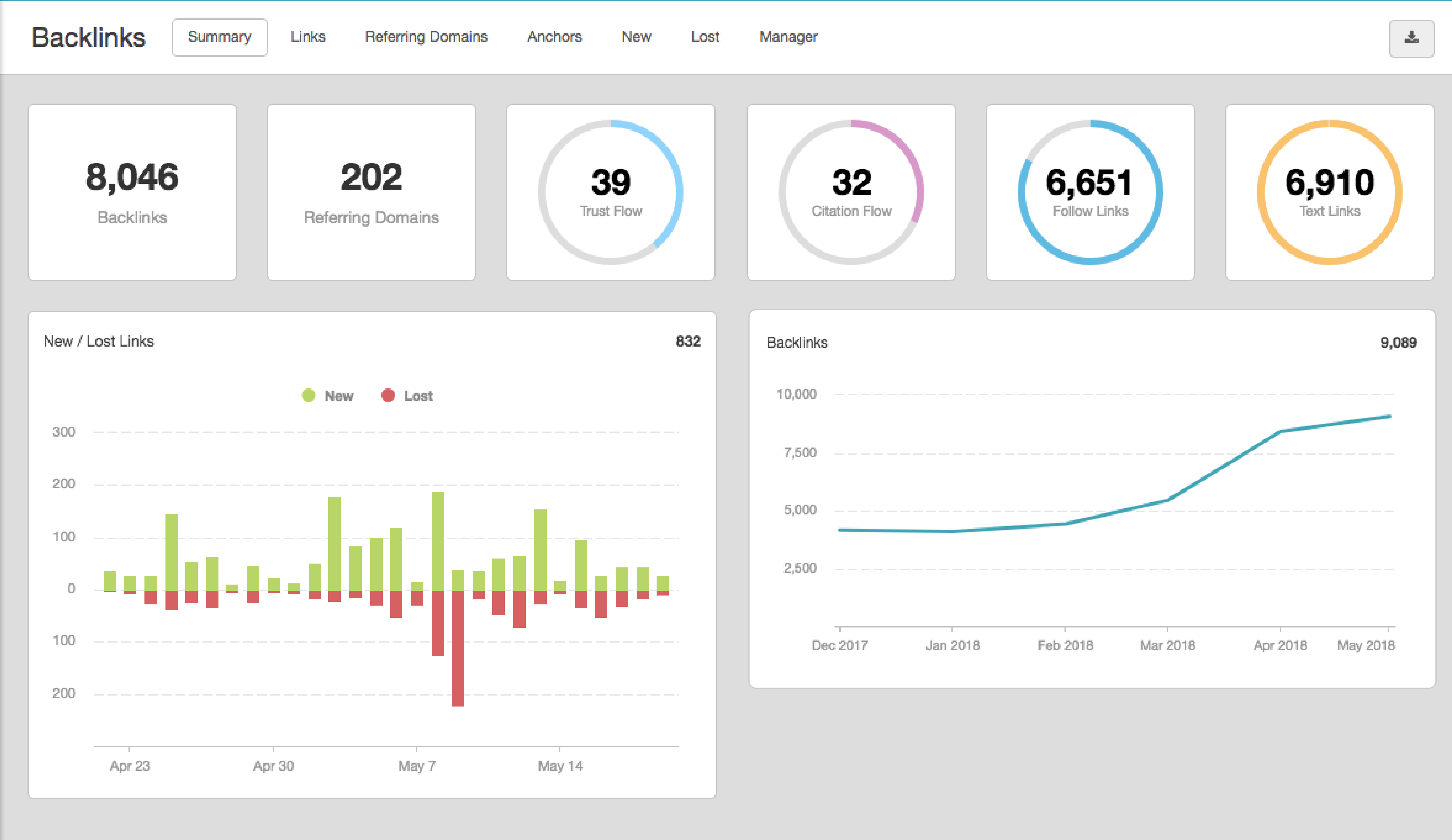
Above, example of various graphs for tracking a firm's backlinks.
The CLM Lounge lets you monitor link growth, link drop off, trust flow, citation flow and lets you dissect your law firm's link portfolio.
No Need for Multiple Logins
The CLM Lounge brings all of your law firm's SEO and PPC data under one roof. The dashboard is designed to easily navigate. Our lounge integrates with:
Google Analytics
Google Ads
Google Search Console
Google My Business
Facebook Ads
Facebook Pages
YouTube
Callrail Call Tracking
Bing Ads
Bing Webmaster Tool
MailChimp, Constant Contact and other mail providers
Plus More
With the CLM Lounge, you can login at any time and know that your campaign is headed in the right direction.
